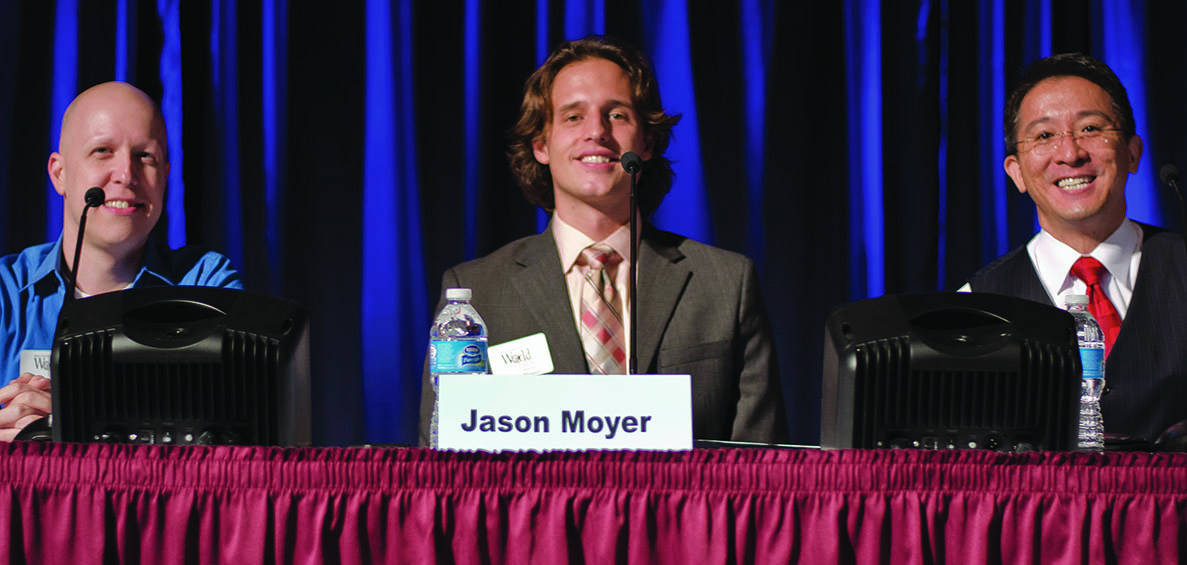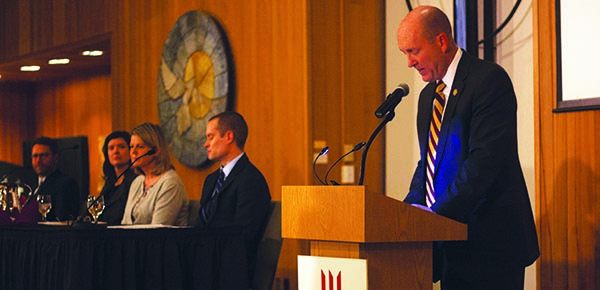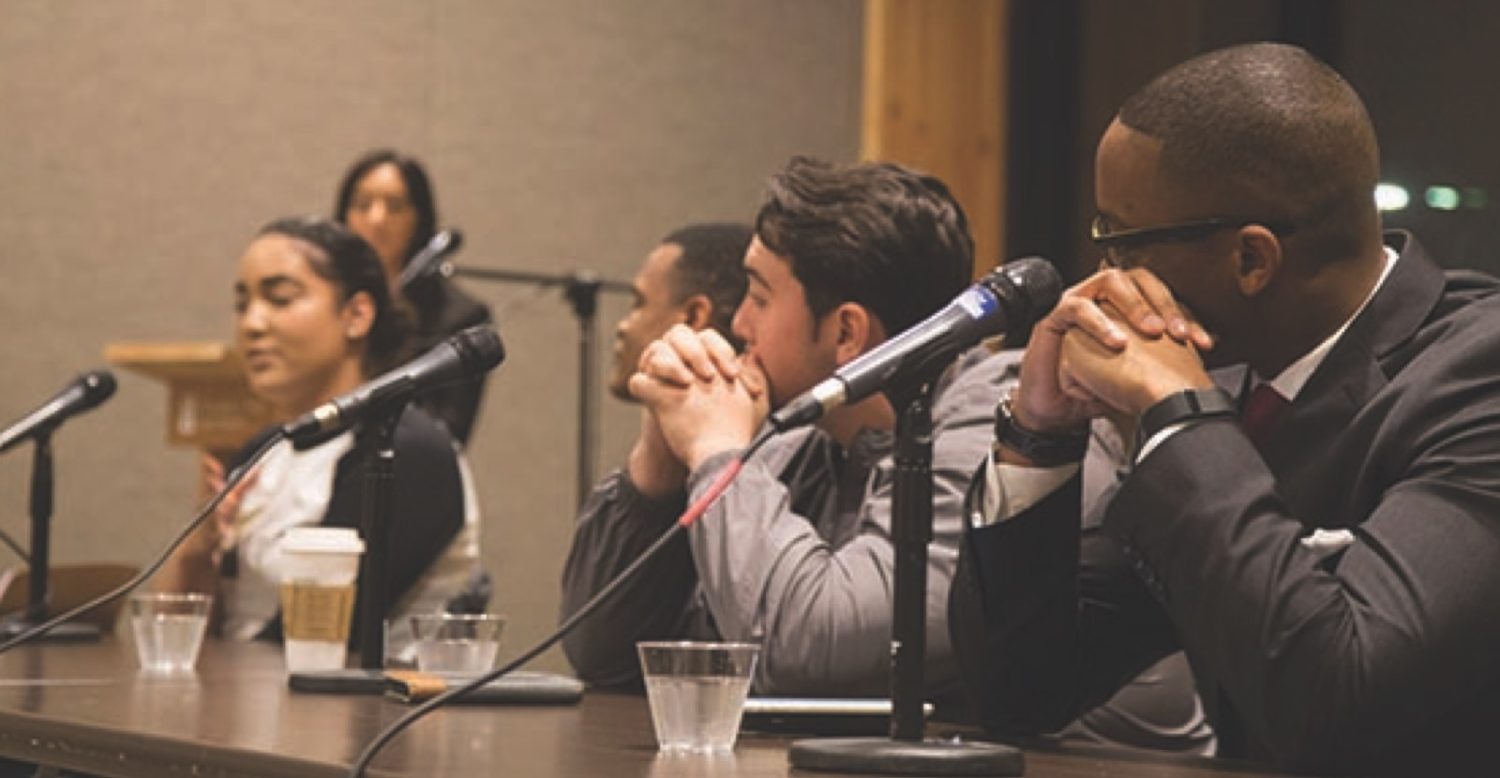Magazine
Take a brief glimpse at the headlines in the news or the arguments on social media feeds and it’s obvious: Political divisions are deeper than ever. This is particularly true in the U.S., where a recent Pew Research study found that Americans believe there are stronger conflicts between political parties today than between racial groups or economic classes. The gaps in survey responses between members of political parties have risen from 15 points in 1994 to 36 points in 2017.
That division spills over and creates a unique tension on college campuses. Students, faculty, and staff alike have proven they want to be involved in the issues that shape our national dialogue, but an increasing number of speakers or events have caused such controversy that any possibility of civil dialogue – conversation meant to enhance understanding of others who hold different views, even if they still don’t result in agreeing with each other’s views – seems impossible.
CCCU institutions, however, strive to be different. They seek to face these realities with courage and conviction. As Christians, we know that we cannot shy away from the hard questions of our day nor placidly accept division or schisms within the body of Christ. Jesus said that we will be known as his disciples because we love one another (John 13). Thus, our institutions are working to create spaces where honest conversations about contentious issues can occur, but within frameworks that foster love, build relationships, and seek to make peace. This article highlights just four of our colleges and universities who have had great success creating space for civil dialogue on campus.

From left: Justin Lee, an author and LGBT Christian activist, Jason Moyer, associate professor of communications at Malone University, and Christopher Yuan, author and professor at Moody Bible Institute, were part of the panel, “Gay and Christian: A Dialogue on the Faith-Driven Life” at Malone University.
MALONE UNIVERSITY
When Malone University (Canton, OH) launched the Worldview Forum in 1999, it was designed as a space for thoughtful conversations about theology. However, the Forum soon expanded and encompassed a different goal.
“It became a way of tackling social and political issues and really trying to better understand what a Christian perspective is,” says Nathan Phinney, a provost and professor of biblical studies at Malone. “[We want] to construct those conversations not as debates with winners and losers, but as thoughtful conversations that explore the issue.”
Each Worldview Forum event features a panel of faculty and outside voices from the community. The university seeks respected experts who hold opposing viewpoints to come together in a conversation moderated by a faculty member.
For example, the 2015 Forum “Black Lives, Blue Lives” featured local law enforcement officers and church leaders. In 2004, Malone invited leaders from a pro-life crisis pregnancy center and the local Planned Parenthood for a conversation on “Fetal Life, Abortion, and Choice.” Other recent Forums have addressed Christian perspectives on capital punishment, the role of the U.S. in world affairs, and political partisanship.
Phinney says the Worldview Forum is one of the reasons he chose to work at Malone. “What impressed me is that [Malone is] intentional about recognizing those voices that aren’t well-respected on campus. And they don’t just talk about those views; they talk to people who actually hold them.”
Opening the door to explorations of alternative opinions and worldviews is a critical piece of the college experience for students. Phinney noted that the Interfaith Diversity Experiences & Attitudes Longitudinal Survey (IDEALS) and the National Survey of Student Engagement (NSSE) both show that Malone students benefit from a deeper examination of other worldviews during their college years. The conversations held each year at the Worldview Forum also spark class discussions that give students the opportunity to engage with the opposing perspectives they hear on stage, making it an integral part of the Malone experience.
“It’s about our learning mission,” says Phinney. “The only way we can learn is by encountering difference.” And as a Christian university, Malone has additional skin in the game, he says. “It’s also about loving our neighbor – it’s about loving a person created in the image of God, and that starts with knowing about them.”
All Worldview Forum events are open to the public. Those who participate hope to model healthy, respectful civil dialogue to the wider community in Canton.
GEORGE FOX UNIVERSITY
At George Fox University (Newberg, OR), Jenny Elsey, associate dean of intercultural life, often heard students of color express the need for a safe space to talk about the issues and tensions they faced. In response, Elsey and her team created Mathetes, a series of monthly seminars on controversial issues.
The use of the biblical Greek word for “disciple” as the seminars’ title is intentional, Elsey says, because it sets the tone for each event. “We want to ask, ‘What is our role in these conversations as disciples of Christ?’ We’re not here to debate. We want people to walk away understanding the human aspects of these topics.”
The programs are now student-led with support from Elsey and her team. Students pick the topic and speakers each month.
“Students generally know who on campus is the best person to speak into an issue,” Elsey says. “We help them find community members who can also contribute to the conversation.”
The meat of each event is in the extended Q&A time after brief comments from the panel. Students verbally ask questions from their seats. The group of about 70 people is just small enough to support a lively discussion in response to each question, and it’s not just the panelists who get to respond – it’s anyone in attendance.
Such an interactive setting is not free from contention. Often what Elsey calls a “pain point” arises – a point of tension that makes people on one side of the conversation feel slighted. Rather than immediately step back from a pain point, Elsey says, moderators encourage students to dig deeper: “What is it about this comment or terminology that’s so sensitive?”
Mathetes facilitators also read a list of ground rules at the beginning of each evening and repeat them if necessary during the group conversation.
George Fox also involves student leaders in their efforts to create space for civil dialogue on campus by holding annual training sessions. Resident advisors and student government representatives watch the video series Convicted Civility (created by former Fuller Theological Seminary president Richard Mouw) and learn how to engage in respectful dialogue with others without compromising their own values. They then participate in diversity training seminars, where they learn how to ask good questions and relate with students of different racial backgrounds.
These efforts humanize the “other” in future conversations between students. But they also build a culture of openness and dialogue on campus. Elsey recounted one incident when a political club invited a conservative speaker to campus. Some liberal students were concerned that the school was supporting the views of this guest. Elsey encouraged liberal students not to disengage and critique the conservative event, but to show up and ask questions. “That we had other outlets for a broad range of viewpoints was helpful to them,” she says. “Students could see us actively working on representing a variety of viewpoints.”

Whitworth University president Beck Taylor (right) created the three-part President's Colloquy series to equip students with the skills and opportunity to engage the Christian approach to truth and disagreement.
WHITWORTH UNIVERSITY
Whitworth University (Spokane, WA) first recognized the need for intentional civil conversation when an informal poll revealed that students, regardless of political ideology, were dissatisfied with the level of discourse on campus. They felt they couldn’t talk to their friends about important issues.
Whitworth president Beck Taylor saw an opportunity. “Christ calls us into these messy issues to be peacemakers,” he says. “Christian schools are shaping their students for leadership in diverse, pluralistic settings.” This year he set up the President’s Colloquy on Civil Discourse, a three-part lecture series on the Christian approach to truth and disagreement.
“We didn’t want to inundate students with weekly opportunities,” Taylor explains. Instead, each of the three events addresses a carefully selected question. The first lecture asked, “Can we still speak the truth in love?” and laid the foundations for dialogue in Christian community. Professors from three departments gathered to discuss the distinctive resources Christians have in the midst of difficult conversation.
The second installment was designed to give students practical tools for disagreement, tolerance, and intellectual virtue. The final panel applied Christian foundations and practical skills to a contemporarily relevant topic: the nature and parameters of free speech. “We picked free speech in part because the issue doesn’t divide people neatly on political lines,” Taylor says.
Each of these three lectures features faculty from different departments on Whitworth’s campus. The departments are diverse – from philosophy to physics to political science. “We want to approach this in an interdisciplinary way,” says Taylor. “Each one of those people can bring in their own insights and experiences.”
The President’s Colloquy is already having positive impacts in the student body. The student government, Associated Students of Whitworth University (ASWU), holds Town Hall events where students gather to discuss difficult issues facing the campus. They had already identified the need to carve out a space for dialogue on campus, and the President’s Colloquy provided the perfect partnership opportunity.
Despite some concerns that the student body would be hesitant to confront these challenging topics, ASWU President Jeff DeBray was sure the Town Hall series would succeed. “There’s never a good time. But with the current political climate, we felt it was necessary to have these conversations, and we felt confident we could do it.”
Each Town Hall covers a topic selected by students and starts with a refresher on guidelines for civil conversation. After an introduction to the topic, participants break into small groups to talk through a list of questions prepared by a panel of knowledgeable students. The small groups reconvene to share their thoughts and discuss action items with faculty members. For example, in a recent Town Hall on Deferred Action for Childhood Arrivals (DACA), speakers ended the session with tips on how to contact legislators about the issue.
“The biggest challenge is always getting a diverse turnout,” DeBray admits. He has sought out different political and issue-based clubs on campus and invited their members to the Town Halls. “People are busy. But I want to seek out diversity to avoid groupthink.”
The President’s Colloquy and the Town Hall series have been launching points for continued conversations among Whitworth faculty and students. They have already begun brainstorming future events and spaces for dialogue on campus. Taylor says, “Whitworth will continue to host debate and discussion on difficult issues – that is the role of any university, but I think as our current colloquy has instructed, it is of particular relevance for institutions that proclaim Christ.”

Students at Gordon College engage in a discussion hosted by the student organization ALANA, which provides support to students of color and works to increase campus knowledge of their history, culture, and contributions.
GORDON COLLEGE
Gordon College (Wenham, MA) has long been a campus bustling with diverse political viewpoints and activity. However, in 2015, during the height of the Black Lives Matter movement, the Student Life staff noticed another form of diversity that was not quite as prevalent.
“Seventy to 80 percent of white Americans don’t have a person of color in their group of friends,” says Nicholas Rowe, dean of student engagement at Gordon. “This is critical, because the demographics of Christianity, in the U.S. and the world, are changing. People of color are already the majority of U.S. Christians ages 19 to 29, and they will drive the conversation of Christian faith expression in the future. How will our white students be part of it?”
Gordon’s Office for Student Life created a Come to the Table program as one step to engage this reality. Come to the Table assigns students to a small group that meets for dinner four times during the semester with other students of different backgrounds, cultures, and race. Groups are comprised so that half are white students and half are students of color. A pair of trained student facilitators, one a person of color and the other white, leads each meeting and assigns readings about race and reconciliation. It is an opportunity for participants to redirect and educate one another; a safe environment where even uncomfortable questions are welcome.
“We hope it’s a launching point for non-structured conversations, too,” Rowe says. “There’s been considerable interest from white students, which is encouraging, and students of color who are willing to engage.”
Beyond these open table dinner discussions, Gordon cultivates a culture of thoughtful discussion and disagreement through a shared faith in Jesus Christ. Political and issue-based clubs are encouraged to come together across the aisle to hold events and formal debates for students. Davis Metzger, president of the Gordon College Student Association (GCSA), says, “There’s a vibrant culture of discourse here that’s student-driven.”
GCSA is highly active on campus, voicing the opinions and concerns of students to the administration and working out points of tension. This puts Gordon in the unique position to model respectful dialogue directly with the student body.
Recently, with the help of GCSA, some students at Gordon passed a resolution asking the college to address actions and policies that have inadvertently “caused hurt to the LGBTQ+ community.” Gordon’s leadership did not feel they could honor all of the resolution’s requests, but instead of leaving the students with a simple “no,” Student Life took the opportunity to start a bigger conversation.
“We wanted to honor the spirit of the resolution, because we are committed to helping our students know how to engage in touchy subject matters with respect and dignity,” says Rowe.
In response to the resolution, Student Life staff partnered with GCSA to host a series on human sexuality entitled “LGBT+ in Christian Community: A Series on Sexuality, Scripture, and Inclusion.” Its focus is to delve deep in the historic theological understanding of sexuality, while recognizing the need for better care for those who are part of the LGBTQ community. Rowe believes the event will place the original student resolution in the much broader context of the theology of human sexuality as a whole.
Rowe and GCSA consider the compromise a success on the whole. “Everything GCSA wants may not necessarily be implemented,” Rowe says. “Our student body elected representatives are thinking sincerely about how our programing and staff can better listen and understand these rising questions. We want to help students feel like they belong.”
The Office of Student Life at Gordon hopes all these campus groups, discussions, and programing serve as models of peaceful and civil discourse for students. Ultimately, these conversations rest on a shared faith that seeks truth and understanding across diverse backgrounds and beliefs. For young Christians, Rowe says, learning how to participate in difficult conversations is a non-negotiable. “Our responsibility is education,” he says, “but also formation.”
RECOMMENDATIONS
These are just four institutions that have recognized and met specific campus needs with grace and creativity. Every school will face its own challenges and devise its own tools to approach those challenges. However, a few common themes ran through the advice gathered from each of these administrators and students.
- Think broadly about campus engagement
To be effective, efforts to teach and encourage civil discourse must be campus-wide. Get academic departments, student activities, and spiritual life involved. If students are expected to engage in civil discourse, university leadership must also practice it.
- Meet students where they are
Some campuses are bustling with students eager to dive into political conversations. Some have students who prefer to fully process ideas before they speak their minds. Others have students who were raised to avoid divisive topics entirely. Regardless, it is important to lay the foundation for healthy dialogue by reminding the campus community what civil discourse and good thinking look like, as it will help set the stage for later conversations that can be challenging and painful. (For a possible resource, see our excerpt and review of How to Think: A Survival Guide for a World at Odds by Baylor University professor Alan Jacobs on pages 60-61.)
- Lay the Ground Rules
In addition to helping students better understand what healthy dialogue and civil discourse are like, event facilitators can help create a good environment for dialogue by reminding event attendees of some guidelines that will help the conversation move forward. Some examples include speaking from personal experience and using “I statements”; speaking truth and personal conviction from a position of love, not of anger; and not interrupting others or cutting off moments of silence when they might be appropriate in the conversation.
- Get students as involved as possible
Whitworth’s Jeff DeBray and Gordon’s Davis Metzger both spoke about the benefits of proactive student governments that plan events to help students engage in difficult topics. But even if a student government is not in the position to plan civic engagement strategies, utilizing student leadership in the planning process can help administration-led efforts be more effective and interactive.
- Remember the purpose: Loving God and loving your neighbor
Jesus instructed us to love the Lord our God with all our heart, soul, mind, and strength, and to love our neighbors as ourselves. Learning more about God and about each other helps us understand how we can better obey this command to love.
Jessica McBirney is the presidential and government relations fellow for the CCCU and a graduate of Biola University.



